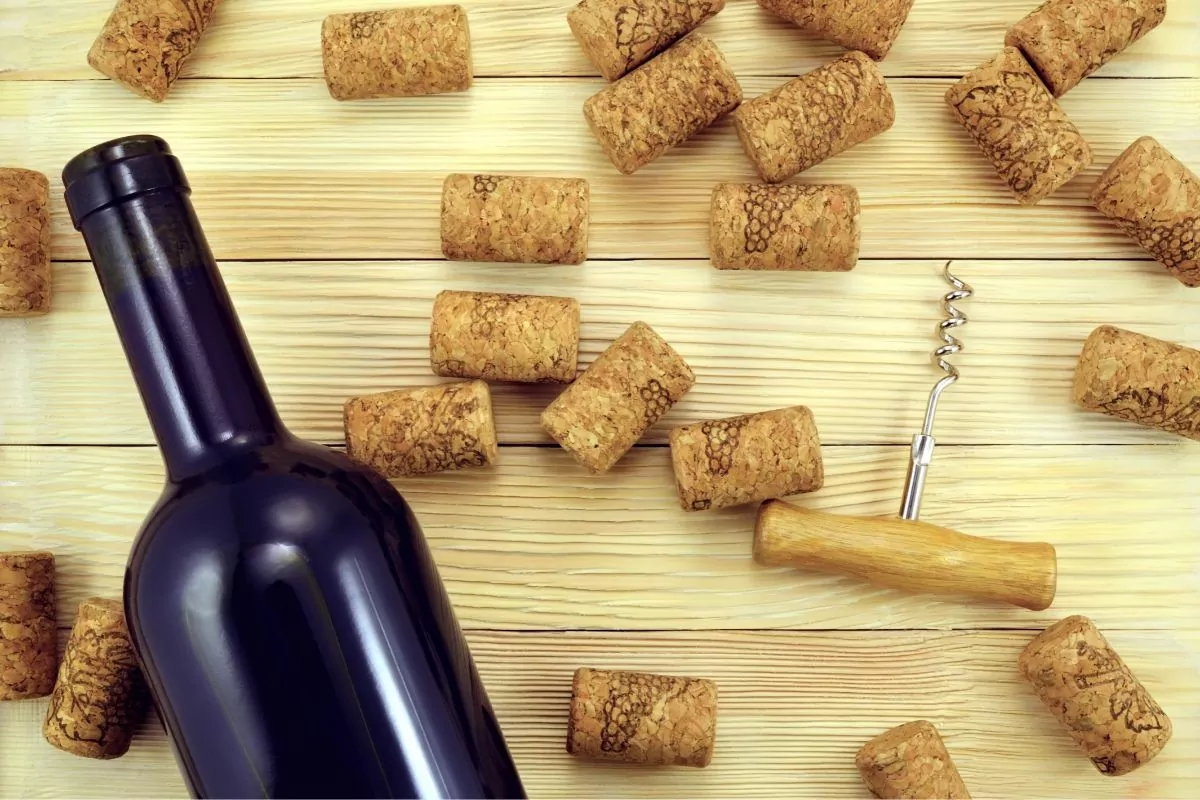Corked wine is a term most wine drinkers are familiar with. Go to any upmarket restaurant, and you can enjoy a theatrical performance by waiters asking you to taste the wine you order first.

You may think that this is to check whether you like the flavor of the wine, but, in fact, this is to determine whether the bottle you have ordered is corked.
For most novice wine drinkers, knowing whether a bottle of wine is corked or not is not all that simple. If you’re unsure what a bottle of corked wine is or how to tell if your bottle is corked, we are here to help.
In today’s post, we are going to find out what it means when a bottle of wine is corked, how a bottle becomes corked, the taste of corked wine, and much more.
By the end of today’s article, you will be on your way to becoming a bona fide wine connoisseur.
Corked Wine Explained
When you think of a corked bottle of wine, you may be thinking of small particles of cork floating around in the wine, or it simply tastes like cork.
This is not the case, as the term “corked wine” is used to refer to wine that has been contaminated with a compound called trichloroanisole (TCA) or cork taint.
Basically, wine can become corked with a TCA-infected cork. The TCA compound forms when different fungi that are naturally found in cork come into contact with each other.
A corked bottle of wine essentially refers to a fault that has occurred during the production process. In turn, this can affect the wine’s taste and aroma.
The wine can acquire an unpleasant taste or moldy smell, greatly diminishing its flavor and overall quality.
There are numerous grades of corked, with some wines being rendered undrinkable, whilst others only have a faint hint so can still be consumed.
Although there have been mass improvements in wine technology over the years, it is still estimated that at least three percent of wines worldwide are corked.
To put this in to perspective; if you are a regular wine drinker, you will generally come across a corked bottle of wine around 100 times during your lifetime.
Encountering a corked bottle can be quite disappointing for wine enthusiasts, as it detracts from the intended enjoyment of the wine-drinking experience.
What Does Corked Wine Taste Like?
The flavor and aroma of corked wine is distinctive, but not in a good way. It tends to have a musty, dank, compost-like, peaty nature.
Some describe it as being like wet cardboard. In other words, a corked bottle of wine does not smell or taste good.
Despite its disappointing flavor, corked wine is not harmful to us in any way. The cork simply affects the smell of the wine and its taste. The wine tends to taste less fruity and dull.
If the aroma and taste of the wine doesn’t offend your senses, you can go ahead and drink it. But, if you question it for one moment and think that it may be corked, it probably is corked.
Of course, if you’ve never consumed much wine, this can be challenging to know, but the more wine you drink, the more you will get accustomed to good and bad wine.
“But what if the cork breaks when I open the bottle?” May people think that pieces of cork falling into wine means the wine is corked. The truth is that this has no effect on whether the wine is corked or not.
If the cork is dry and crumbles, it could be an indication that the wine is older and has been exposed to air. This means that the wine may have passed its prime, but that’s a whole other matter.
How Does A Bottle Of Wine Become Corked?
As we discussed above, a bottle of wine becomes corked when the chemical compound known as TCA (2,4,6 – trichloroanisole) forms.
When natural corks used in sealing wine bottles come into contact with specific chlorides present in bleaches and other winery sterilization/ sanitation products, the fungi naturally present in the cork can be infected.
This contamination can occur in wineries that utilize infected corks, leading to a tainted wine.
If left unchecked, trichloroanisole (TCA) has the potential to contaminate not only a single set of corks and the accompanying wine, but can spread throughout an entire winery or cellar.
Once established, eradicating TCA becomes an arduous task.
Since the cause of cork taint was discovered in the early 1990s, most wineries have completely eliminated the utilization of chlorine-based clearing products, leading to a lower number of bottles being corked today.
What To Do If You Are Served Or Buy Corked Wine?

It’s something every wine enthusiast dreads; you open the bottle to enjoy a glass of wine after a hard day’s work (Also check out National Wine Days To Add To Your Calendar). But, to your horror, the bottle is corked.
If this happens to you, you have the right to send it back when in a restaurant or return the bottle to the store or establishment you purchased it from.
When returning a bottle of wine to a retailer, they will rarely question it if it is corked. However, this is not the case if the bottle has been mostly finished!
When in a restaurant, the same rule applies to when returning a bottle you bought online or in-store. That being said, it can sometimes be a little more sensitive or difficult in such an environment.
For many, searching for faults in wine is not something they are familiar with. Therefore, they may feel intimidated to ask for a new bottle, especially if they are unsure if the bottle is even tainted.
Sometimes, novice wine drinkers may not even notice the wine is corked when tasting the wine first.
In some cases, it might require around ten to fifteen minutes for you or someone in your group to notice any issues with the wine.
If this occurs, our suggestion is to summon the waiter and provide an explanation, requesting them to sample the wine. If the wine is truly corked, it should become readily apparent to the sommelier or waiter without any delay.
The result? You should get a new bottle of uncorked wine.
What Is Being Done To Stop Corked Wine?
While completely eliminating the possibility of corked issues is unlikely, top manufacturers in the cork industry have recognized the problem and taken steps to address it. However, this is despite initially downplaying the issue.
As a result, several advanced quality assurance and quality control procedures, as well as treatments, have been implemented to reduce the susceptibility of cork to developing cork taint.
These measures aim to improve the overall quality and reliability of cork used in the wine industry.
Nevertheless, whatever steps are taken, some bottles of wine will still become corked. After all, it is caused by natural fungi that is found everywhere and multiple chemical reactions.
We’ll always have to suffer the odd bottle of corked wine, but hopefully, fewer and fewer.
Are There Fewer Corked Bottles Of Wine These Days?
Because of advances in the wine and cork industries, it does seem that the problem of cork taint is not as prominent as it was a decade or so before.
Ten or so years ago, around one in five bottles may have been tainted, but today, you’ll unlikely find a corked bottle for weeks, even when drinking a few bottles a week.
The wine industry has made considerable efforts to address the issue of cork taint and improve the quality of closures.
As for the cork industry, key players have implemented stricter quality control measures and introduced advanced technologies to minimize the occurrence of TCA contamination in corks.
Also, many wineries have started using alternative closures such as screw caps and synthetic corks, which are less susceptible to cork taint.
These measures, along with increased awareness and education within the industry, have resulted in a notable decrease in corked bottles of wine.
This, therefore, provides wine enthusiasts with a more consistent and enjoyable drinking experience.
Can You Still Drink Corked Wine?
Yes, corked wine is not harmful in any way. However, whilst it is safe to drink corked wine, the unpleasant smell and taste make it unenjoyable for most people.
Cork taint significantly affects the wine’s flavor and can mask its true characteristics.
If you encounter a corked bottle, we recommend that you seek a replacement or alternative wine to fully enjoy your wine-drinking experience.
In Summary
A corked bottle of wine occurs when the compound trichloroanisole (TCA) contaminates the wine.
This contamination typically occurs when natural corks come into contact with certain fungi or chlorine-based substances during the production process.
If you think your bottle is corked, ask for another or send it back. Compare and contrast an uncorked bottle with a corked bottle, and you will notice the differences immediately.
- Why Does Wine Taste Better With Age? - June 14, 2023
- What Does It Mean When A Bottle Of Wine Is Corked? - June 14, 2023
- Wine Fridge Vs Wine Cellar – Which One Should You Choose? - June 14, 2023
